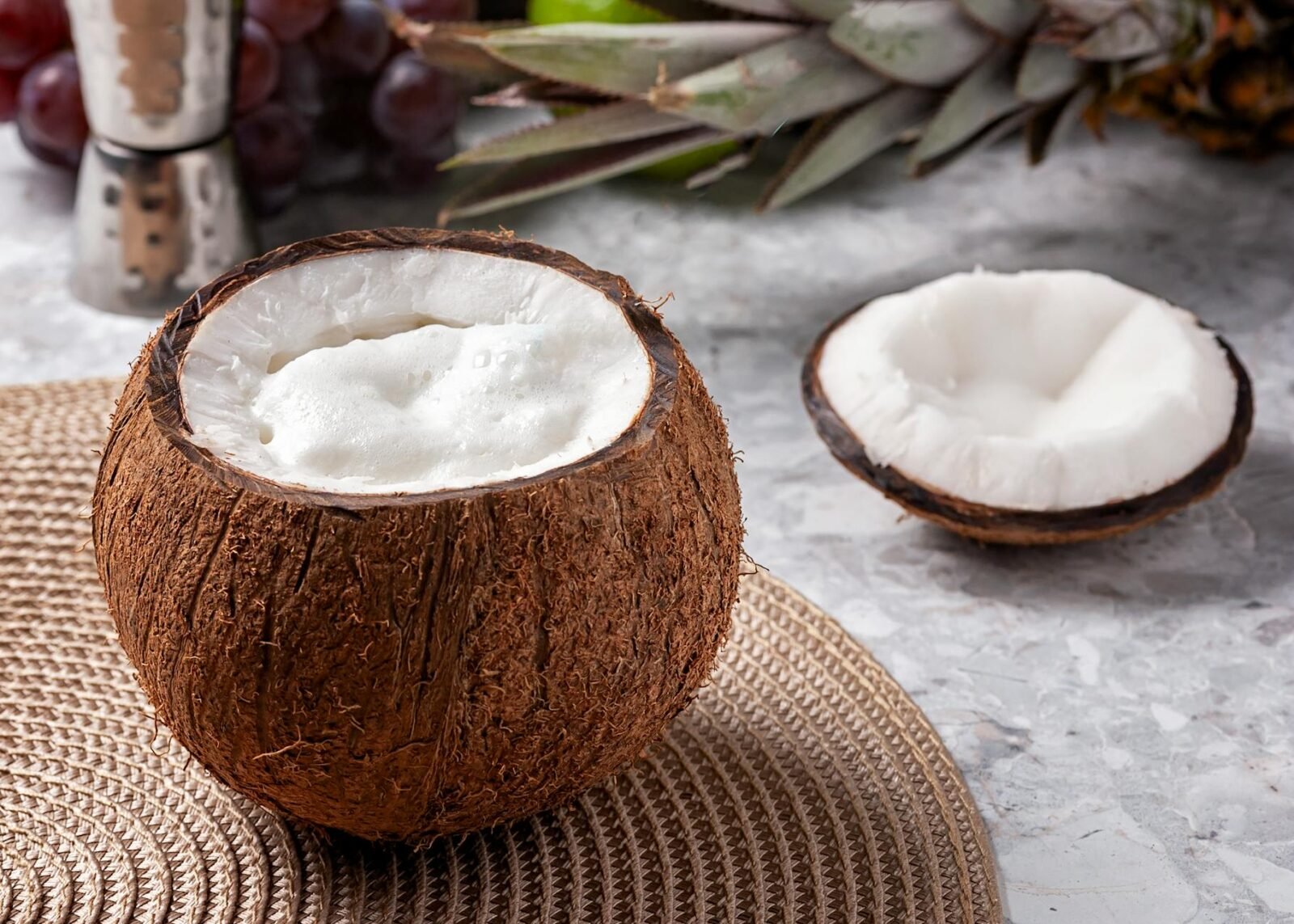Last Updated on November 6, 2024 by Daniele Lima
Understanding Coconut Oil: The Basics
Coconut oil has become one of the most popular products in recent years, presenting itself as a true elixir of health and beauty. From culinary recipes to skin and hair care, its versatility is impressive. But at the end of the day, is really good for your health or is it just another fad? In this article, we will explore the facts and dispel the most common myths about this ingredient, helping you understand once and for all the true impact of coconut oil on your health.
While many tout coconut oil as a miracle solution to a variety of health problems, others point to its potential dangers, especially when consumed in excess. Opinions differ between experts and the general public, creating confusion that is difficult to clear up. Our goal here is to provide a balanced, evidence-based analysis so you can make informed decisions about using coconut in your routine.
Coconut oil is extracted from the pulp of the coconut and consists mainly of saturated fatty acids. Unlike other vegetable oils, it is solid at room temperature and has a relatively low melting point, making it liquid in warmer climates. The main components of coconut are lauric acid, capric acid, and caprylic acid, which are responsible for many of the health claims associated with it.
Table of Contents
Debunking the Top Coconut Oil Myths
Myth 1: Coconut Oil is a Superfood
One of the most common myths about coconut oil is the idea that it is a superfood that can improve health across the board. Many say it can help with weight loss, increase energy, and even prevent cardiovascular disease.
Fact: Although coconut oil has many potential benefits, calling it a “superfood” may be a stretch. Lauric acid, which makes up about 50% of oil, can increase HDL (“good” cholesterol), but it also increases LDL (“bad” cholesterol). According to the American Heart Association, excessive consumption of saturated fatty acids, such as those found in coconut, may increase the risk of heart disease. Therefore, coconut oil should be consumed in moderation as part of a balanced diet.
Myth 2: Coconut Oil Aids in Weight Loss

Another popular belief is that coconut can be a powerful weight-loss tool. The theory is that the medium-chain triglycerides (MCT) found in coconut are quickly metabolized by the body, increasing energy expenditure and promoting fat burning.
Fact: Although some studies suggest that MCTs may slightly increase metabolism, the effects on weight loss are minimal and do not justify excessive consumption of coconut. Additionally, coconut oil is high in calories, containing around 120 calories per tablespoon. For those trying to lose weight, it is important to remember that portion control and adopting a varied and balanced diet are essential. Coconut oil can be included but in moderation.
Myth 3: Coconut Oil is Superior to Other Vegetable Oils
Many people think that coconut oil is a healthier option than other vegetable oils, such as olive oil or canola oil. This belief is based on the idea that the saturated fatty acids in coconut are less likely to oxidize at high temperatures, making it a better choice for cooking.
Fact: Although coconut oil is more stable at high temperatures than some other oils, it is not necessarily healthier. Oils like olive oil and canola oil contain monounsaturated and polyunsaturated fatty acids, which are beneficial for heart health. Additionally, extra olive oil is rich in antioxidants and has been linked to a number of health benefits, including reducing the risk of cardiovascular disease. Therefore, when choosing a cooking oil, it is important to consider the stability and nutritional profile of the oil.
Myth 4: Coconut Oil is a Miracle for the Skin and the Hair
Coconut oil is widely used in beauty and personal care products and claims it can moisturize skin, fight aging, and strengthen hair.
Fact: Coconut oil has moisturizing properties and is effective for many skin types, especially dry skin. It can also help protect hair and reduce protein loss when used as a pre-wash. However, it is not suitable for all skin types, especially those that are oily or acne-prone, as it can clog pores and cause breakouts. Therefore, even though coconut oil may be beneficial for some, it is important to use it with caution and preferably do a sensitivity test before using it widely.
Myth 5: Coconut Oil Prevents Serious Illnesses
Many claim that coconut can prevent or even cure serious diseases such as Alzheimer’s disease, diabetes, and cancer due to its antioxidant and anti-inflammatory properties.
Fact: There is currently no solid scientific evidence to support these claims. Although some preliminary studies suggest that coconut can have antioxidant and anti-inflammatory effects, these are not strong enough to justify its use as a treatment or prevention of serious diseases. It is always important to consult a healthcare professional before making significant changes to your diet or lifestyle, especially when it comes to treating or preventing medical problems.
Incorporating Coconut Oil Safely into Your Routine

If you like the taste and properties of coconut oil, there is no need to completely eliminate it from your diet. However, it is essential to use it in moderation. Here are some tips for incorporating it in a healthy way:
Moderate substitutions: Use coconut in small amounts, partially replacing other oils or saturated fats in your diet.
Variety is key: don’t limit yourself to oil. Try a variety of vegetable oils, such as olive oil and avocado oil, for a balance of healthy fatty acids.
Choose the unrefined: opt for virgin coconut, which is less processed and retains more nutrients and flavor.
Use in suitable recipes: Coconut is great for recipes that benefit from its distinctive flavor, like curries, smoothies, and breads. However, remember that it is high in calories, so use it in moderation.
The Bottom Line: Balanced Approach to Coconut Oil
Coconut oil can be a delicious and versatile addition to your diet and self-care routine, but it’s important not to fall prey to the myths surrounding this ingredient. Like any other nutritional or beauty product, it must be used in a balanced and conscious way. By separating the facts from the myths, you can enjoy the benefits of coconut oil without risking your health. Remember that the secret to a healthy life lies in moderation and an informed choice of the products we consume.
FAQ
Is coconut oil a healthy alternative to other vegetable oils?
While coconut oil has some potential benefits, it is not necessarily healthier than other plant-based oils like olive oil or avocado oil. The key is to use oil in moderation as part of a balanced diet.
Can coconut oil help with weight loss?
There is limited evidence that the medium-chain triglycerides (MCTs) in coconut can slightly boost metabolism, but the overall impact on weight loss is minimal. Maintaining a calorie-controlled, nutrient-dense diet and regular exercise are more effective for sustainable weight management.
Does coconut oil have anti-aging or skin-healing properties?
Coconut can be beneficial for some skin types, especially dry skin, due to its moisturizing properties. However, it may not be suitable for oily or acne-prone skin as it can clog pores. It’s important to do a patch test before using coconut extensively on the skin.
Can coconut oil prevent or cure serious diseases like Alzheimer’s or cancer?
There is currently no strong scientific evidence to support the claim that coconut can prevent or cure serious illnesses like Alzheimer’s disease or cancer. While it has some antioxidant and anti-inflammatory properties, these are not powerful enough to justify using oil as a treatment or preventative measure for such conditions.
How much coconut oil should I consume daily?
Coconut oil should be consumed in moderation as part of a balanced diet. The American Heart Association recommends limiting saturated fat intake, including oil, to no more than 5-6% of your total daily caloric intake.









Leave a Reply